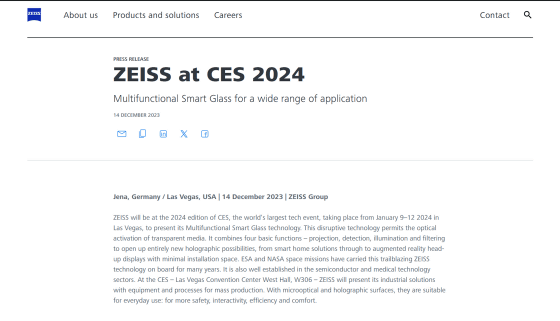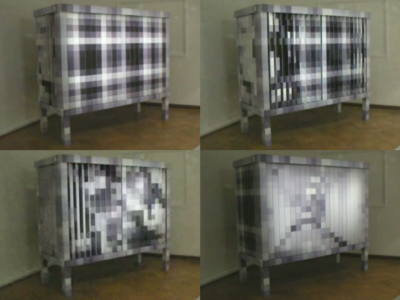Carl Zeiss develops technology that turns all windows and glass into 'invisible transparent cameras'

German optical equipment manufacturer
ZEISS at CES 2024
https://www.zeiss.com/corporate/en/about-zeiss/present/newsroom/press-releases/2023/microoptics-ces.html

This holographic camera turns any window into an invisible camera | Digital Camera World
https://www.digitalcameraworld.com/news/this-holographic-camera-turns-any-window-into-an-invisible-camera
Zeiss Smart Glass tech could place a transparent camera mid-window
https://newatlas.com/technology/zeiss-multifunctional-smart-glass-ces-2024/
Zeiss set to unveil transparent camera tech at CES 2024
https://interestingengineering.com/innovation/its-here-zeiss-to-unveil-transparent-camera-tech-at-ces2024
In recent years, ZEISS has been focusing on the development of heads-up displays (HUDs) that display various information on glass, and announced an attempt to install HUDs in cars at the 2023 international motor show IAA Mobility held in Germany. Did.
ZEISS' technology is built around thin polymer films that turn any glass surface into an on-demand screen, including building and car windows, glass screens and more. This film is equipped with an ultra-high-precision optical system and boasts a transparency of over 92%, and combines the four basic functions of 'projection, detection, illumination, and filtering' to create applications ranging from smart home solutions to AR head-up displays. It is said to open up completely new holographic possibilities.
By projecting information onto a car's windshield using a HUD, drivers can obtain the information they need without taking their eyes off the ground. ZEISS also claims that holographic 3D content offers greater freedom to change the design and add functionality, such as making projected images and text visible only from the inside or outside, or painting windows black. doing.

Furthermore, ZEISS reports that it has developed a technology that uses coupling, decoupling, and light guiding elements to guide incident light to hidden sensors, turning glass into a 'transparent camera.' ZEISS says that by commercializing a transparent camera called ``Holocam'', it will be possible to reduce the installation space for cameras used for distance warnings, parking sensors, driver fatigue detection systems, etc.
Also, if a ``screen or display with a built-in camera'' becomes a reality, it may be possible to place a transparent camera in the center of the screen of a PC or smartphone. By embedding the camera in the screen itself, it may be easier for participants to make eye contact during video conferences, and the space devoted to the camera may be reduced.
There are also a wide range of other applications for transparent cameras integrated into glass, such as smart intercoms that do not require an additional camera module, or facial recognition or gesture detection devices needed to unlock doors.

In addition, a video of the 'transparent camera' that ZEISS exhibited at IAA Mobility 2023 has been posted on YouTube.
The glass on the left is a specially processed transparent camera, and the image taken by the camera is displayed on the screen on the right.

Even if you look closely at a transparent camera, you won't be able to tell that it's a camera.

The images that can be taken with the transparent cameras exhibited at IAA Mobility are monochrome and have low resolution, but we were able to see a man pointing his smartphone at the camera.

Digital Camera World, a media specializing in cameras, says, ``Of course, technologies like transparent cameras have dark potential. 'The idea that every window or shower door in a rental property could spy on you is a little disconcerting.'
On the social news site Hacker News, regarding the concerns brought about by ``transparent cameras'', ``Such camera glass is not 100% transparent and is used for special purposes, and its resolution and low-light performance are quite poor.'' Comments such as ``It will become a reality'' and ``With pinhole cameras with lenses as small as 2mm already readily available, concerns that Airbnb hosts will use them to spy on their guests'' are no exception. If holes, photo frames, electrical appliances, electrical outlets, smoke detectors, etc. have not been inspected, it cannot be said that new vulnerabilities have been added.''
Zeiss's 'Holocam' turns glass windows into cameras | Hacker News
https://news.ycombinator.com/item?id=38881981
Related Posts:







